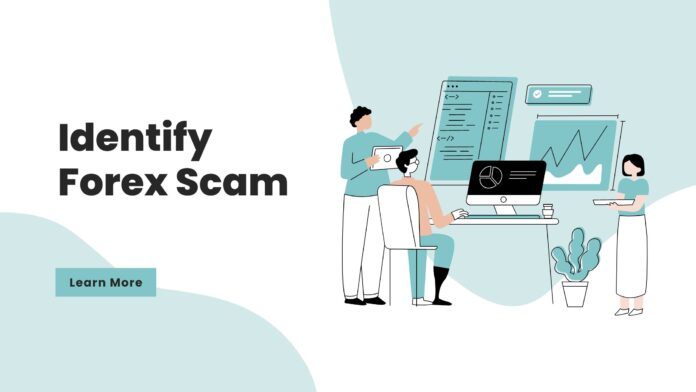Forex remains a solid investment choice, but it can be difficult to spot online con artists. Any method used to trick traders and convince investors that trading on the forex market will generate substantial returns is called “foreign exchange fraud. “A party gains while the other loses in a zero-sum game called foreign exchange.
Everyone is now aware of how risky investments made online may be. It is especially true in the context of currency exchange. Online Forex scams abound, started by con artists who gain confidence from the anonymity of the Internet. To avoid financial disaster, it is essential to distinguish fraud from actual forex trading activity.
HOW DO FOREX SCAMS WORK?
Forex scams have illicitly claimed money from many people. The scammers frequently take advantage of traders’ lack of experience, making many potential traders abandon trading altogether.
The most typical sorts of forex scams to be on the lookout for are as follows:
Bid/Ask Spread Scam:It is one of the first Forex scams to use fake bid/ask spreads. Trading turns into a Non-profit activity when there is a cancellation of investment returns and transfer of those profits to the brokers. But for this reason, there are stringent spread laws that only permit tiny spreads. However, many brokers operate without being overseen by any financial organization, making it easy for a novice to fall for their con.
MLM/Pyramid Scheme in Forex:The structure simulates a pyramid, with the most significant investor—typically the scheme’s owner—gaining new members who pay the recruiter’s initial fees. As a result, the recruited members receive their down-lines, responsible for paying them their recruiters’ upfront fees. Furthermore, your earnings increase as you move up the pyramid. Since no real products are offered, such a business model is comparable to MLM. Is Forex a pyramid scheme, then? No, it isn’t, but the pyramid scheme is built on investments in legal financial instruments like real estate, stocks, and Forex.
Signal Seller Scam:Retail businesses, managed investment account providers, and asset pool managers operate on a daily, weekly, or monthly fee schedule. Then, using their fictitious professional experience and promises of financial gain, they assert they know the ideal moment to buy or sell currency pairings.
The “Trading Bot” Scam:A “trading bot” is a computer algorithm that executes Forex trades automatically. Additionally, there are a tonne of fraudulent trading bots in the market which rookie traders are susceptible to encounter. Because these bots are unqualified to make wise decisions, their users are unable to profit. Instead, they only build patterns using historical market data that eventually prove to be unsuccessful.
Withdrawal Fraud:Generally speaking, subscribing to websites that promise instant financial success is not a good idea. Another scam involves a trader being unable to withdraw money from their account. When you question it at this point, the broker either doesn’t react or cannot provide any valid response.
Common Warning Signs of A Forex Scam
Aggressive forex brokers:For its victims, recovery from a forex scam can be a difficult and drawn out process. Therefore, it is vital to identify the essential warning signals to avoid being a victim. Genuine forex brokers are not forceful while promoting their abilities or services to potential clients. If forex trading interests you, it is necessary to exercise care when a few forex brokers or businesses contact you repeatedly even when you do not know them directly. You can also ask for broker recommendations from people you know.
Inflated promises of great returns: Exaggerated boasts of enormous investment returns are a common sign of a forex fraudster. It’s definitely a scam if you’re promised large returns that are guaranteed. Your investment performance is primarily based on how volatile the market is. Returns might arrive quickly, or they might not. However, a business that promises consistently significant returns is lying to you because it is impractical in the foreign exchange industry.
The forex market is open 24 hours a day, but it operates in different time zones, and therefore, it is divided into four main trading sessions: Sydney, Tokyo, London and New York.
Excessive spreads: The usual spread in USD/EUR ranges between two and three points. When a forex trader appeals to you and offers spaces of up to seven points, proceed with caution. Remember that there are four decimal places in the pricing of important currency pairs.
Use of complex terminology: To prey on their victims, forex scammers utilize their understanding of the foreign exchange industry by employing complex language. Words like risk disclosures and usage restrictions are sometimes used to limit their liability should investors suffer losses along the way.
Limits on withdrawal: It’s time to start worrying about your investment if you are seeking to draw money from your account but cannot do so. You should review your investment or, better yet, remove it before losing more money if a broker responds to this with a faint justification or imprecise apology.
Blocklisted broker: Please avoid brokers who can’t show you their qualifications at all costs. You want a trustworthy person managing your account. Investigate any pertinent regulatory bodies to see if a forex broker is in good standing with the law in the foreign exchange market.
Conclusion:
To avoid falling for a forex scam, it is advised to work with a regulated broker with a solid reputation, an impeccable track record, and favorable feedback from previous and current investors. Although it can be challenging to resist the draw of rapid profits, it is advisable to take caution and conduct a more comprehensive due diligence.
Write and Win: Participate in Creative writing Contest & International Essay Contest and win fabulous prizes.















